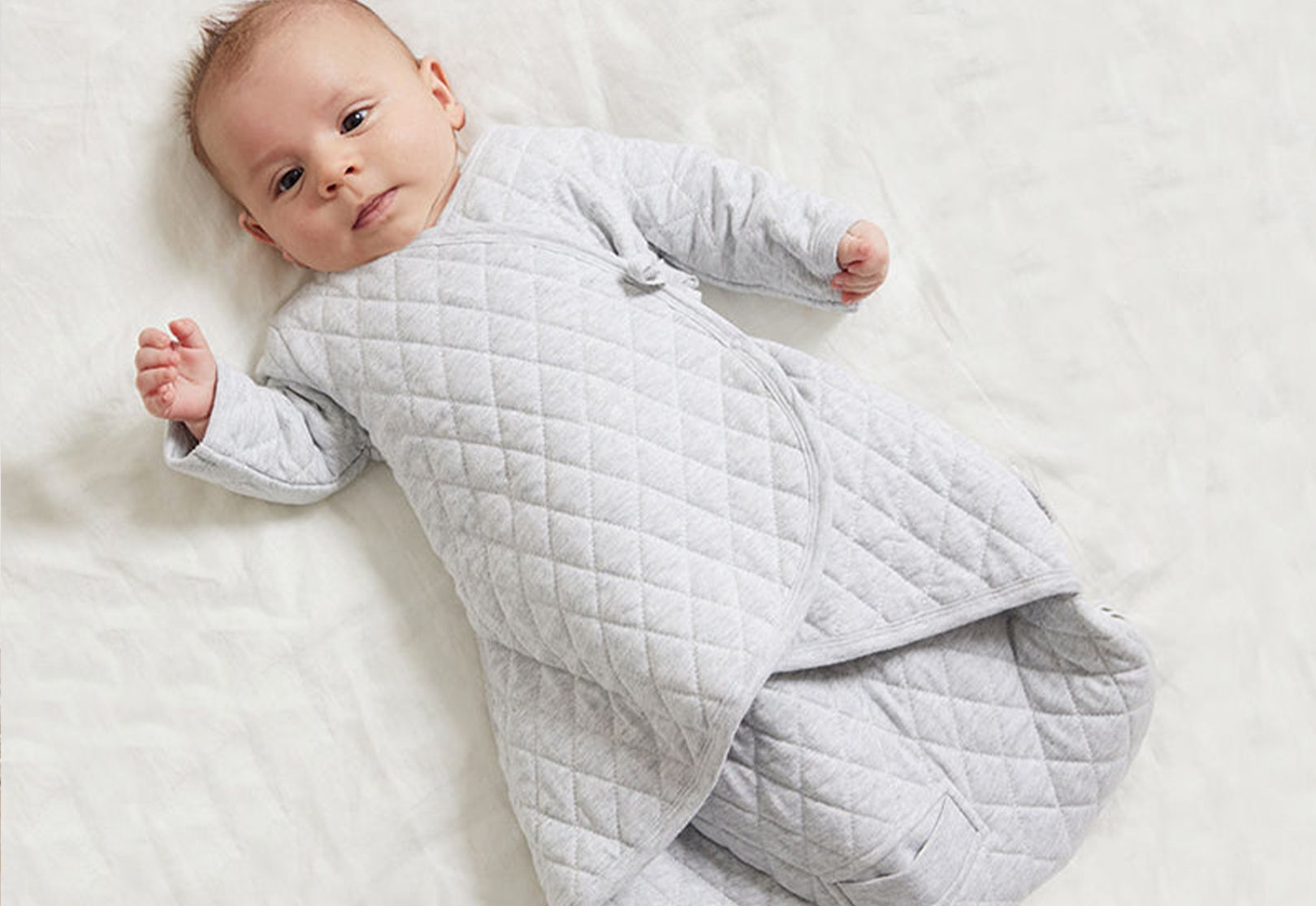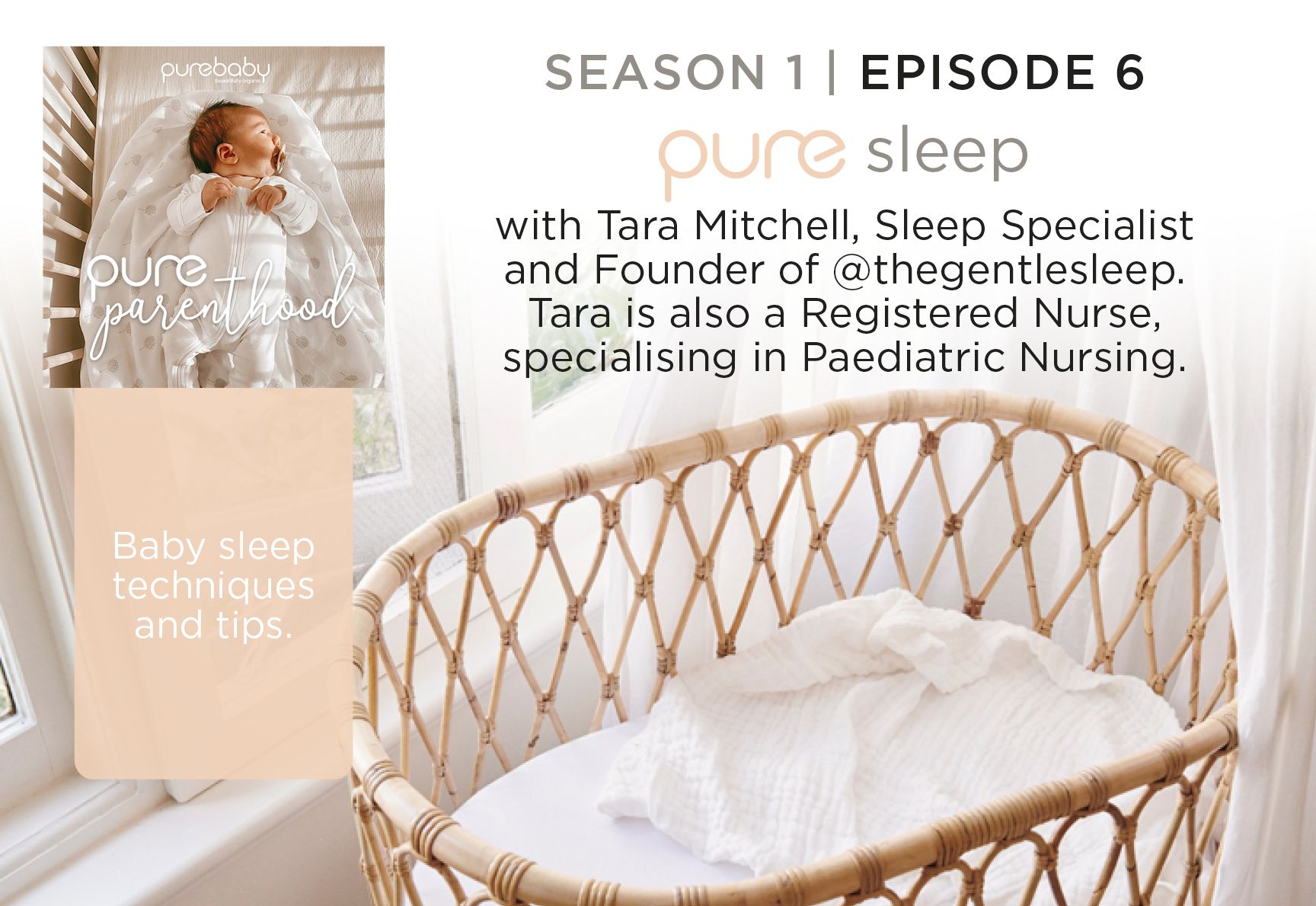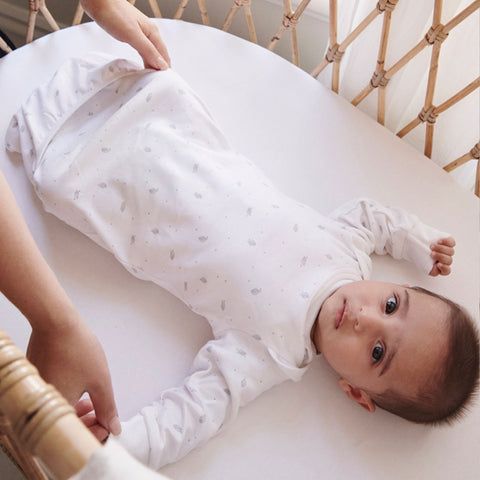
Purebaby’s New Sleep Solutions
5 min read | 9 March 2021
New In
Essentials
Clothing
Accessories
Shop By Gender
Shop By Size
Collections
Baby
Clothing
Accessories
Shop By Gender
Shop By Size
Collections
Nursery
Care
Play
Kids
Clothing
Accessories
Shop By Gender
Shop By Size
Collections
Care
Play
Gifts
Baby Gifting
Kids Gifting
Shop By Price
Shop By Event
Shop By Gender
Sale
Sale
Shop By Gender
Learn
Education
Resources
Pre-Loved
Rewards
17 min read | 13 September 2020

When I had my first baby, my beautiful daughter Scarlett, I suffered from sleep deprivation. It was before I was a Sleep Consultant, so I wasn’t sure of exactly what I should be doing. I spent many long and lonely days and nights trying to get her to sleep. My experience with my second baby, Tommy, was completely different. By then, I knew exactly what I was supposed to do, and as a result, I went from not just surviving the experience, but actually thriving! So trust me when I say… sleep deprivation does NOT need to be part and parcel of parenting a newborn! Don’t believe the rumour that children shouldn’t sleep well, and that it always has to be a struggle for parents. This is just simply not true.
Sleep is such a fundamental pillar of health, both physical and mental. In my own life and in the lives of thousands of my clients, I’ve seen that once sleep is prioritised, it is a complete game changer. Quality sleep is absolutely achievable, and critical both for you as parents, and also for the development of your little one.
Sleep isn’t a stagnant state - the brain does amazing things during this time and lays the foundation for a healthy baby. It promotes better feeding, focus, and the ability for your little one to cope with their day. During sleep, your baby’s brain is allowed the chance to process information and develop, as well as giving your little ones body time to rest and restore.
So from one formerly-weary parent to another, here are some facts to help you better understand your baby’s sleep, followed by some practical tips on how you can improve sleep for your little one.

I’m sure you’ve heard of the word ‘catnap’ being used to describe the short period of time that babies seem to sleep for. When babies are little, their sleep cycles are shorter and typically range between 30 to 50 minutes. However don’t be fooled, just because their sleep cycles are shorter doesn’t mean they can’t achieve longer periods of quality sleep. They certainly need it, in fact infants generally need around 16 to 22 hours sleep a day!
During their sleep, you may notice your young baby is quite restless. This is because young babes spend 50% of their sleep period in R.E.M. (rapid eye movement – a more active sleep stage), as opposed to us adults at a mere 20%. During this stage of sleep, you’ll see twitching eyeballs and jerking bodies. Don’t mistake this for an unsettled sleep, or feel the need to intervene. Let sleeping babies lie! Keep in mind, when little ones use external measures to get to sleep (such as the dummy, rocking etc.), they can struggle to get into these deeper stages of sleep.
The deepest sleep for your baby (and in fact all of us) occurs in the first half of the night, which is why many people say they get their best stint of sleep in the first 4 – 5 hours. After midnight strikes, your baby transitions to lighter sleep cycles which can mean a lot more waking. This is especially the case if they rely on external measures to get back to sleep. This is also why I don’t recommend ‘dream feeding��’, as if it’s in this early part of the night, you are pulling your little one out of their deepest sleep.
Whether it be 5 minutes or 5 hours, your little ones have no idea how long they’ve slept for. This means that when they’re up, they’re up and ready to go again! This is why you may have found yourself in the situation where bub has woken after only 5 to 10 minutes into a nap and they refuse to go back down. For this reason, I recommend one of two things. Firstly, if your little one falls asleep, preserve that sleep to ensure they nap as long as they can. Alternatively, keep baby wide awake so you can put them down to sleep at a more suitable time or place. Dozing on feeds might also be the reason your little one refuses their upcoming nap. This happens as they have had a quick kip on the feed and counted this as their sleep.
Sleep = more sleep. That’s right! The better rested you are, the easier it is to achieve more quality sleep. Tiredness is a trigger for your little ones to release stress hormones such as cortisol and adrenaline. Once this happens, they will find it harder to get to sleep and remain in a good rhythm of sleep, which allows them to sleep for longer. For this reason, trying to get baby really tired before putting them down will not help them achieve a better sleep.
Healthy sleep habits are not only for the lucky. They can absolutely be achieved, irrespective of your baby’s temperament, milestones, teething or regressions. Don’t worry – your baby is not the exception to this rule, no matter how ‘bad’ a sleeper you think they are! Good quality and quantity of sleep has the ability to dramatically improve the physical, emotional and relational well being of the entire family.
Most regressions usually come about from a change of sleep patterns. This change can be triggered by things such as growth spurts or brain development. For example, around the four-month mark, your little one’s sleep cycles become more structured.
Instead of drifting seamlessly between sleep periods, they are more likely to awaken between each cycle. Your baby will also be becoming more aware of the patterns and associations that they’re learning around sleep.
If you are playing a significant role in getting your little one to sleep (or back to sleep), this may now be what your baby is becoming increasingly reliant on during these awake points. To help with these changes, allowing your baby to have an understanding of their own sleep space, encouraging them to fall asleep where they will wake up. Creating other sustainable sleep habits will help their sleep immensely, and will bring about much better outcomes during these regressions.

Here are some easy to follow tips on how to get your little ones on the right track to healthy sleep habits:
Our little ones thrive off routine. It allows them to become familiar and in turn secure with their sleep experiences. Some examples of providing consistency include; a bedtime routine, choosing a phrase for sleep, and allowing them to sleep in their designated sleep space (e.g. their bassinet) as regularly as possible.
Newborns and young babies have a very short awake time before they need to go back down for sleep. Don’t wait until it’s too late to put your baby down. The more over-tired they are, the more they may fight their nap - and that’s a battle you will not often win!
Over-tired babies are sometimes hard to spot, and tired signs can be deceiving! Yawning, rubbing eyes and whinging can mean time for bed for some little ones, but not necessarily for others. I encourage my clients to use the awake times suited for their child’s age. Fifteen minutes before these times, start to observe your little one’s behaviour to see if you notice any tired signs or changes in behaviour or mood. Awake times for newborns 8 weeks and under should be between 45-75 minutes (this time should include feeding). Newborns over 8 weeks old will have 60-90 minutes awake time. If your little one is taking short naps, you might find 60 minutes is a stretch and that’s okay. I would rather you put your baby down more regularly than end up with an overtired infant.
No matter which settling style you wish to use (whether it be patting, feeding, rocking, independent sleep or using a dummy to get your little one to sleep), be mindful that after the newborn period, the role you choose or play often becomes what they associate with sleep. A style that is very ‘hands-on’ is hard to sustain in the long term.
Our days are often filled with activities, people, and being out and about. If your baby has regular fussy periods, turns in to you or has trouble settling, it might be an idea to give your little one some down time to recover.
Whether it be for a nap or a night sleep, there are a few things you can do to set up their sleep environment. Use white noise to block out any sounds that may rouse them from sleep, and darken the room. Dress your little one appropriately for sleep too in a growsuit or onesie, as cold babies commonly wake persistently through the early hours of the morning or wake early. Having sleeping bags that are made from a natural, breathable fibre is extremely important when it comes to keeping your little one warm and safe.

Lasting positive sleep habits and peaceful nights are achieved when your little one has the skills to self-settle. This means that they have the skills to get themselves to sleep (and back to sleep between sleep cycles), without any external intervention such as putting in a dummy, patting, rocking etc. When teaching baby these skills, it’s so important to have good support to give you the confidence to know what you’re doing is best for your little one.
Throughout this parenting journey, especially in the early stages, it’s so important not to lose sight of your own mental and physical health, as well as the health of your relationships. Keeping an eye out for this will really help you find the strength required to pull through this often-intense time.
Don’t over schedule your days… I’ll say it again – do not over schedule!
Pre-cook some meals (if you have the time) so that once baby is asleep you actually get some time to relax.
If you have a partner, don’t wait for date night every 3 months before you do something nice. Look for small things to do for one another every day, and of course do small things for yourself too!
Engage when and where you can in something that helps you feel like yourself.
Allow yourself and encourage your partner to get back into an old sport or activity.
Schedule time with friends, even if it’s only once a month. Even when you can’t be bothered, you will more than likely be glad you went!
Be kind and empathetic to yourself and to one another. This is a huge change in your life and it’s only natural for there to be tough times.
Remember, you don’t get a medal for doing everything yourself! Accept or ask for help when it’s on offer. Also, if sleep is an issue for your little one, I implore you to get it sorted. It will change your entire experience - relationally, emotionally and physically. I have worked with too many couples that regretted the depths of despair they had been in before asking for help. It is NOT worth taking the toll unnecessarily on you and your relationships. We also cannot underestimate the power of happy, healthy parents when it comes to great outcomes for your little ones.
This article was written by Tara Mitchell, in conjunction with episode 6 of Purebaby’s podcast, Pure Parenthood. Tara is a sleep specialist and the founder of The Gentle Sleep Specialist. Tara is also a Registered Nurse, specialising in Paediatric Nursing. To learn more about the Gentle Sleep Specialist, visit their website for more information.
Shops the full range of baby sleeping accessories at Purebaby now.
Sign up to Pure Love Rewards and get $10 off your first online order, earn points every time you shop and more!